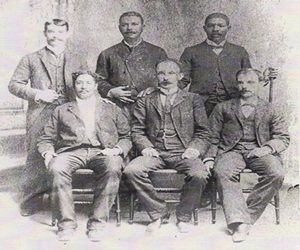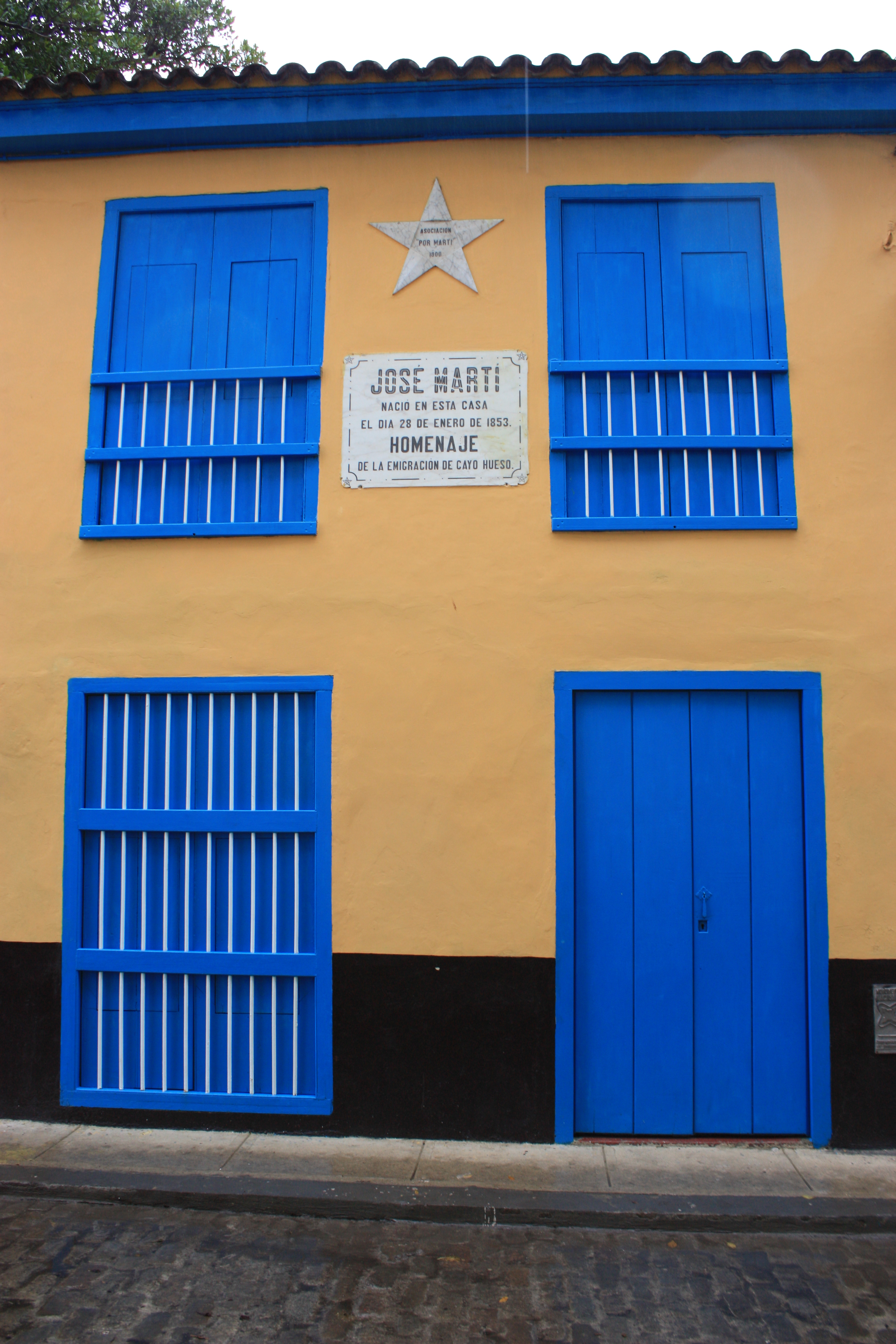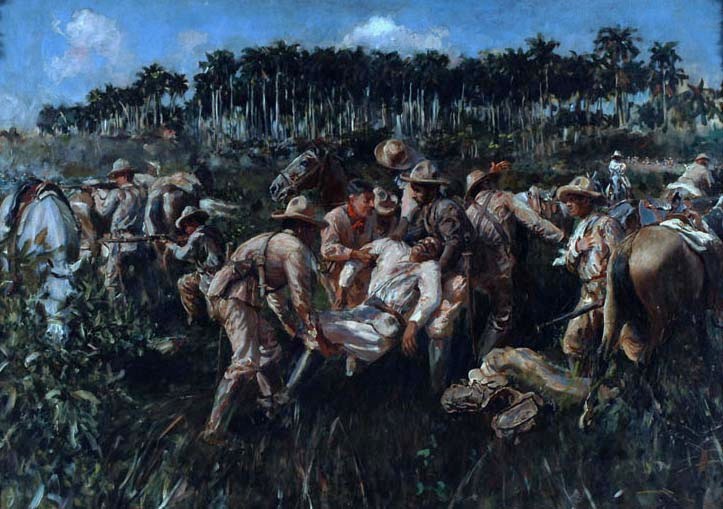|
Patria (newspaper)
''Patria's'' first issue appeared on March 14, 1892. Writer José Martí played a leading role in founding the paper as the official publication of the Cuban Revolutionary Party. It provided a method of spreading information that could be accessible to Cubans about the Cuban War of Independence. Background Cuban War of Independence The Cuban War of Independence came seventeen years after the end of the unsuccessful Ten Years War, also considered the first war of Cuban Independence. As a result of that war there was a rise in political corruption, high taxes for Cuba's citizens, and lack of political representation. While exiled in New York, Martí worked with Máximo Gómez, who had been a Major General of the Ten Years' War, to build a coalition that ultimately led to the invasion of Cuba from the Eastern region in 1895, which quickly spread and led to the conquering of parts of the Western region. Many of the people involved with the invasion included individuals from th ... [...More Info...] [...Related Items...] OR: [Wikipedia] [Google] [Baidu] |
José Martí
José Julián Martí Pérez (; January 28, 1853 – May 19, 1895) was a Cuban nationalist, poet, philosopher, essayist, journalist, translator, professor, and publisher, who is considered a Cuban national hero because of his role in the liberation of his country from Spain. He was also an important figure in Latin American literature. He was very politically active and is considered an important philosopher and political theorist. Through his writings and political activity, he became a symbol of Cuba's bid for independence from the Spanish Empire in the 19th century, and is referred to as the "Apostle of Cuban Independence". From adolescence, he dedicated his life to the promotion of liberty, political independence for Cuba, and intellectual independence for all Spanish Americans; his death was used as a cry for Cuban independence from Spain by both the Cuban revolutionaries and those Cubans previously reluctant to start a revolt. Born in Havana, Spanish Empire, Martí began h ... [...More Info...] [...Related Items...] OR: [Wikipedia] [Google] [Baidu] |
Cuban War Of Independence
The Cuban War of Independence (), fought from 1895 to 1898, was the last of three liberation wars that Cuba fought against Spain, the other two being the Ten Years' War (1868–1878) and the Little War (1879–1880). The final three months of the conflict escalated to become the Spanish–American War, with United States forces being deployed in Cuba, Puerto Rico, and the Philippine Islands against Spain. Historians disagree as to the extent that United States officials were motivated to intervene for humanitarian reasons but agree that yellow journalism exaggerated atrocities attributed to Spanish forces against Cuban civilians. Background During the years 1879–1888 of the so-called "Rewarding Truce", lasting for 17 years from the end of the Ten Years' War in 1878, there were fundamental social changes in Cuban society. With the abolition of slavery in October 1886, freedmen joined the ranks of farmers and the urban working class. The economy could no longer sustain itse ... [...More Info...] [...Related Items...] OR: [Wikipedia] [Google] [Baidu] |
Ten Years' War
The Ten Years' War ( es, Guerra de los Diez Años; 1868–1878), also known as the Great War () and the War of '68, was part of Cuba's fight for independence from Spain. The uprising was led by Cuban-born planters and other wealthy natives. On 10 October 1868, sugar mill owner Carlos Manuel de Céspedes and his followers proclaimed independence, beginning the conflict. This was the first of three liberation wars that Cuba fought against Spain, the other two being the Little War (1879–1880) and the Cuban War of Independence (1895–1898). The final three months of the last conflict escalated with United States involvement, leading to the Spanish–American War. Background Slavery Cuban business owners demanded fundamental social and economic reforms from Spain, which ruled the colony. Lax enforcement of the slave trade ban had resulted in a dramatic increase in imports of Africans, estimated at 90,000 slaves from 1856 to 1860. This occurred despite a strong abolitionist m ... [...More Info...] [...Related Items...] OR: [Wikipedia] [Google] [Baidu] |
Máximo Gómez
Máximo Gómez y Báez (November 18, 1836 – June 17, 1905) was a Dominican Generalissimo in Cuban War of Independence, Cuba's War of Independence (1895–1898). He was known for his controversial Scorched earth, scorched-earth policy, which entailed dynamiting passenger trains and torching the Spanish loyalists' property and sugar plantations—including many owned by Americans. He greatly increased the efficacy of the attacks by torturing and killing not only Spanish soldiers, but also Spanish sympathizers. By the time the Spanish–American War broke out in April 1898, Gómez had the Spanish forces on the ropes. He refused to join forces with the Spanish in fighting off the United States, and he retired to a villa outside of Havana after the war's end. Early life Gómez was born on November 18, 1836 in the town of Baní, in the province of Peravia, in what is now the Dominican Republic. During his teenage years, he joined in the battles against the frequent Haitian incurs ... [...More Info...] [...Related Items...] OR: [Wikipedia] [Google] [Baidu] |
Cuban Revolutionary Party
Cuban may refer to: * Something of, from, or related to Cuba, a country in the Caribbean * Cubans, people from Cuba, or of Cuban descent ** Cuban exile, a person who left Cuba for political reasons, or a descendant thereof * Cuban citizen, a person who is part of the Cuban population, see Demographics of Cuba * Cuban Spanish, the dialect of Cuba * Cuban Americans, citizens of the United States who are of Cuban descent * Cuban cigar, often referred to as "Cubans" * Cuban culture * Cuban cuisine ** Cuban sandwich * Cuban-eight, a type of aerobatic maneuver People with the surname * Brian Cuban (born 1961), American lawyer and activist * Mark Cuban (born 1958), American entrepreneur See also * Cuban Missile Crisis * List of Cubans * * Cuban Boys, a British music act * Kuban (other) * Cubane Cubane () is a synthetic hydrocarbon compound that consists of eight carbon atoms arranged at the corners of a cube, with one hydrogen atom attached to each carbon atom. A solid cry ... [...More Info...] [...Related Items...] OR: [Wikipedia] [Google] [Baidu] |
New York City
New York, often called New York City or NYC, is the List of United States cities by population, most populous city in the United States. With a 2020 population of 8,804,190 distributed over , New York City is also the List of United States cities by population density, most densely populated major city in the United States, and is more than twice as populous as second-place Los Angeles. New York City lies at the southern tip of New York (state), New York State, and constitutes the geographical and demographic center of both the Northeast megalopolis and the New York metropolitan area, the largest metropolitan area in the world by urban area, urban landmass. With over 20.1 million people in its metropolitan statistical area and 23.5 million in its combined statistical area as of 2020, New York is one of the world's most populous Megacity, megacities, and over 58 million people live within of the city. New York City is a global city, global Culture of New ... [...More Info...] [...Related Items...] OR: [Wikipedia] [Google] [Baidu] |
Cuba
Cuba ( , ), officially the Republic of Cuba ( es, República de Cuba, links=no ), is an island country comprising the island of Cuba, as well as Isla de la Juventud and several minor archipelagos. Cuba is located where the northern Caribbean Sea, Gulf of Mexico, and Atlantic Ocean meet. Cuba is located east of the Yucatán Peninsula (Mexico), south of both the American state of Florida and the Bahamas, west of Hispaniola ( Haiti/Dominican Republic), and north of both Jamaica and the Cayman Islands. Havana is the largest city and capital; other major cities include Santiago de Cuba and Camagüey. The official area of the Republic of Cuba is (without the territorial waters) but a total of 350,730 km² (135,418 sq mi) including the exclusive economic zone. Cuba is the second-most populous country in the Caribbean after Haiti, with over 11 million inhabitants. The territory that is now Cuba was inhabited by the Ciboney people from the 4th millennium BC with the Gua ... [...More Info...] [...Related Items...] OR: [Wikipedia] [Google] [Baidu] |
United States
The United States of America (U.S.A. or USA), commonly known as the United States (U.S. or US) or America, is a country primarily located in North America. It consists of 50 states, a federal district, five major unincorporated territories, nine Minor Outlying Islands, and 326 Indian reservations. The United States is also in free association with three Pacific Island sovereign states: the Federated States of Micronesia, the Marshall Islands, and the Republic of Palau. It is the world's third-largest country by both land and total area. It shares land borders with Canada to its north and with Mexico to its south and has maritime borders with the Bahamas, Cuba, Russia, and other nations. With a population of over 333 million, it is the most populous country in the Americas and the third most populous in the world. The national capital of the United States is Washington, D.C. and its most populous city and principal financial center is New York City. Paleo-Americ ... [...More Info...] [...Related Items...] OR: [Wikipedia] [Google] [Baidu] |
Freedom Of Speech
Freedom of speech is a principle that supports the freedom of an individual or a community to articulate their opinions and ideas without fear of retaliation, censorship, or legal sanction. The right to freedom of expression has been recognised as a human right in the Universal Declaration of Human Rights and international human rights law by the United Nations. Many countries have constitutional law that protects free speech. Terms like ''free speech'', ''freedom of speech,'' and ''freedom of expression'' are used interchangeably in political discourse. However, in a legal sense, the freedom of expression includes any activity of seeking, receiving, and imparting information or ideas, regardless of the medium used. Article 19 of the UDHR states that "everyone shall have the right to hold opinions without interference" and "everyone shall have the right to freedom of expression; this right shall include freedom to seek, receive, and impart information and ideas of all kinds, ... [...More Info...] [...Related Items...] OR: [Wikipedia] [Google] [Baidu] |
Sotero Figueroa
Sotero Figueroa Hernández was born in Ponce, Puerto Rico, in 1851. He studied at the school of Rafael Cordero in San Juan, and was later known for his work as a journalist, dramatist, speaker and author of biographical essays. He was also a loyal defender of Puerto Rican and Cuban independence. Figueroa died and was buried in Cuba in 1923. Early years Figueroa was born in the city of Ponce, Puerto Rico, in 1851 and is believed to have studied at the Rafael Cordero school in San Juan. In his youth, he was apprenticed to the office of the typographer in the capital printing press of the liberal and Puerto Rican abolitionist, José Julián Acosta, a former student of maestro Rafael Cordero. Writing Before moving to New York, Figueroa’s first job as a writer in Puerto Rico was in Ramon Marín’s print shop, Establicimiento Tipográphico; there he wrote pieces for ''La Crónica'' and ''El Pueblo'' and acted as editor of these in Marín's absence. Figueroa began a print sho ... [...More Info...] [...Related Items...] OR: [Wikipedia] [Google] [Baidu] |






.jpg)
